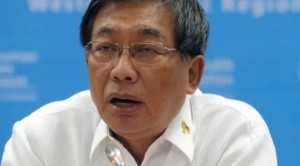MANILA, Philippines—Health Secretary Enrique Ona disclosed on Tuesday, that his department received P3.3 billion in total allocations under the controversial Disbursement Acceleration Program (DAP).
The amount went to the purchase of medicines, supplies and medical equipment; the hiring of more nurses and midwives; and improvements in public health facilities necessary for the ordinary Filipino to access better health care at the least possible cost, said Ona.
“[The funding] gave us the capacity to modernize, to supply, equip and not only rehabilitate health facilities but also augment our resources to hire the additional health workers that our country severely needed at that time,” said Ona at a press conference at the DOH headquarters in Manila on Tuesday.
Defending the program, which the Supreme Court has declared unconstitutional, Ona said a big bulk of the allocation went to the government’s universal healthcare program.
“Kalusugan Pangkalahatan (Universal health care) is not a simple and fast program to implement but with the expansion in fiscal space provided by the DAP concept, the Department of Health was able to move at a faster pace than otherwise possible,” said Ona at a press briefing in Manila.
Based on his report, 44 percent or P1.496 billion was allotted to subsidize the PhilHealth coverage of over 2.9 million indigent families in 2011, with the most number of beneficiaries coming from Central Luzon (575,187 families) and Central Visayas (575,081).
At least 23 percent of the total DAP funding, which translated to P770 million, was used to augment the 2011 Maintenance and Other Operating Expenses (MOOE) and capital outlay requirements of the following hospitals: the Lung Center of the Philippines (P105 million), the Philippine Children’s Medical Center (P280 million), Philippine Heart Center (P357 million), Women’s and Children’s Protection Unit of 16 DOH hospitals (P17 million) and 12 other DOH hospitals (P10.7 million).
Financial assistance worth P76 million in 2011 and 2012 were given to indigent patients in various hospitals. This amount covered medical expenses such as medicines, medical and surgical supplies, laboratory and diagnostic imaging procedures, said Ona.
To support the ARMM Transition Investment Support Plan (TISP) in the same years, P756 million was given to the seven provinces in the region for health infrastructure development; the construction, repair and renovation of 194 health facilities; and the procurement of life-saving medical equipment and diagnostic tools in 231 health facilities, including land and sea ambulances.
A total of nine percent or P294 million were used to augment funding for the Registered Nurses for Health Enhancement and Local Service (RN Heals).
With the additional funds, the DOH was able to deploy 11,500 nurses to address the problem of lack of staff and improve the accessibility to quality health care services in 1,529 municipalities, said Ona.
“With additional funding under the DAP concept, various DOH programs and projects were achieved to address the health needs especially of the very poor,” he pointed out.
RELATED STORIES
Aquino gripes: SC paralyzing development
